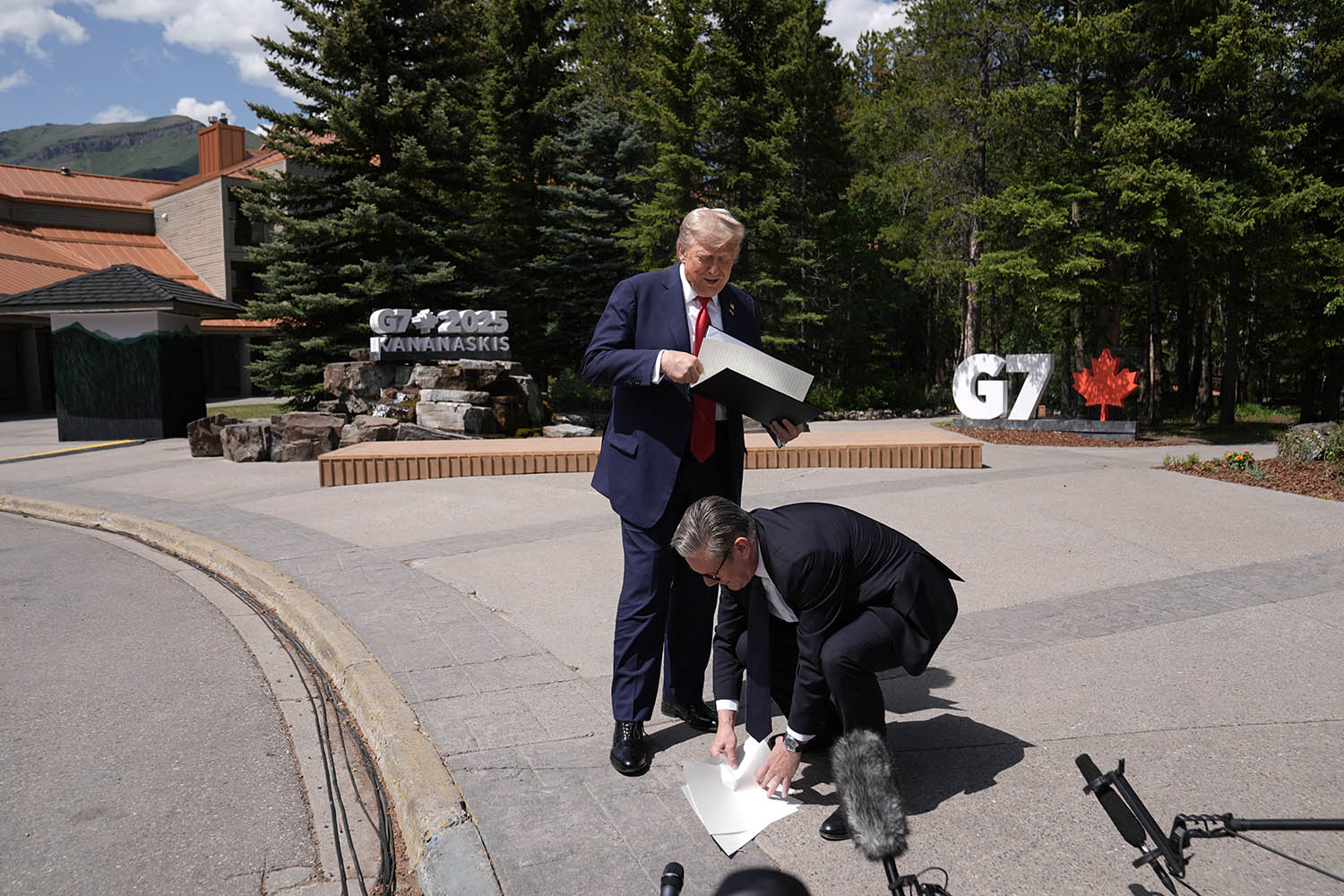The sight of President Trump dropping pages of a “trade deal” between the US and UK was symbolic of the way the White House solipsist operates. Whether deliberate or accidental, the incident had the British prime minister once again looking subservient as he stooped to the ground to pick up the pieces.
This was before Donald Trump contemptuously insulted his host prime minister, Mark Carney of Canada, and the other members of the G7 by walking out early. It was insulting to other leaders and their staff, some of whom had crossed the world to attend the meeting. And yet another slap in the face to the concept of global cooperation that has characterised the postwar world.
Global cooperation in economic matters has had its ups and downs, and it was for this reason that the leaders of five leading industrial nations – the US, UK, France, West Germany and Japan – formed, along with Italy, what was initially the G6 in 1975. I covered the first meeting, in Rambouillet outside Paris, which had been called in the belief, or hope, that leaders conferring in relative privacy could overcome some of the tensions that impeded negotiations between their ministers, not least on trade.
The G6 soon expanded into the G7 when Canada joined a year later and remained so until, after the collapse of the Soviet Union in 1991, it further grew to include Russia and became known variously as the G7+1 or the G8.
The idea was to incorporate Russia into the advanced industrial world economy and what one hoped were its civilised values, but the idea didn’t endure and Russia was rightly expelled in 2014 when it invaded Ukraine. This signalled the end of the high hopes engendered in 1991, not least because Vladimir Putin had made it clear that he regarded the collapse of the USSR – welcomed in most of the rest of the world – as “the biggest geopolitical catastrophe of the century”. To add insult to injury, last week Trump even said last week that Russia should be welcomed back and the G7 expanded once again to the G8.
With his tariff wars, Trump has mocked the whole point of why the institution was founded. It is embarrassing to see a British prime minister trying to scrape together a “deal” aimed at mitigating the damage they are causing.
‘Starmer and Reeves stumble from one glaring misjudgment to another’
‘Starmer and Reeves stumble from one glaring misjudgment to another’
As US domestic inflation climbs, tariffs certainly won’t help most of the Americans who were fooled by Trump. t is now all too apparent that, with his tax cuts and savage approach to public spending, the Trump regime believes in redistribution of income and wealth – but only to the already rich in general and the Trump family in particular.
Yet this is the man our prime minister regards as someone with whom, for reasons of realpolitik, he should do business with, instead of calling Trump the seriously disruptive force he is, and teaming up with Canada and our former EU partners to resist him.
It’s a fraught word but Starmer’s approach to Trump looks ominously like a shortsighted form of appeasement. Meanwhile, back in Starmer's own parish, he and his chancellor stumble from one glaring misjudgment to another. It is good that there is now a serious focus on the NHS and infrastructure investment, and that the government has recognised the folly of the way it mishandled the winter fuel issue. But the enormous political cost of the latter will linger
Moreover, local government is a serious casualty of the chancellor’s spending review, which means that hard-pressed local services are likely to suffer. Both central government and local authorities still face budgetary constraints. Which once again underlines the folly of ruling out a return to the customs union and the single market.
Newsletters
Choose the newsletters you want to receive
View more
For information about how The Observer protects your data, read our Privacy Policy
A new study by John Springford, associate fellow of the Centre for European Reform, finds that the annual loss of 4% of gross domestic product from Brexit – as estimated by the Office for Budgetary Responsibility – implies a loss of £40bn a year in tax revenue. He points out that this would have offset “a sizeable chunk” of the £100bn of taxes raised by the 2019-24 Conservative government.
Unfortunately, the damage continues for Starmer’s government, and continues to constrain Chancellor Reeves’s freedom of movement.
Photograph Stephan Rousseau/AFP via Getty

